

|
DescriptionASM 502 is a low cost but powerful DXF to Gerber translator intended to aid those who want to use AutoCAD (or other mechanical drafting programs) and need to create Gerber data for photoplotting. Simple menus take you step by step through the translation process. Special functions help you assign blocks to flashes and set up draw apertures from polyline widths automatically. Our powerful Gerber viewer, GBRVU, displays up to 48 layers simultaneously and lets you quickly verify your Gerber data before submitting your plot job. ASM 502 outputs standard RS74D for conventional photoplotters and also RS274X with embedded apertures for Gerber Scientific's line of Crescent photoplotter. |
ApplicationsFeatures |
Easy-to-Use Menu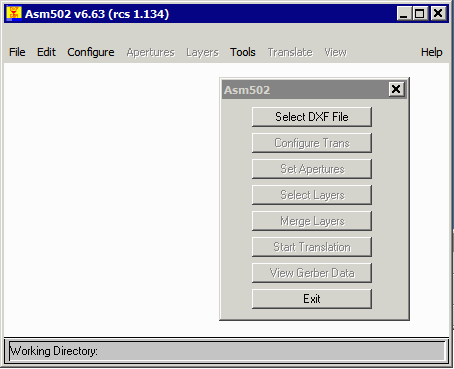
|
ASM 502/W is easy to use - the main button menu takes you step by step through the procedures to create Gerber data. Click each button and a dialog box opens. Fill in the settings (or accept the default settings) and move on to the next button. |
Configuring the Translator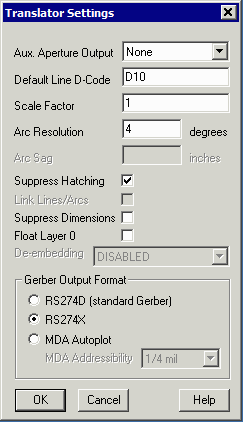
|
The user can configure ASM 502's behavior quickly and easily. For example you can choose to output standard RS274D and also the more advanced RS274X or MDA Autoplot. ASM 502 remembers your settings in the .ini file so that after you have used the program once, you don't need to re-enter settings that never change. |
Configuring the Gerber Output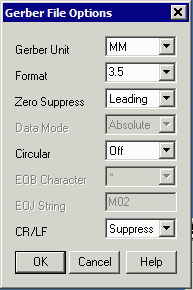
|
ASM 502W enables the user to control the Gerber Format, data mode and CR/LF usage as needed for your particular photoplotter. |
Defining AperturesIn order to have a Gerber file you must define the apertures that the plotter will use. ASM 502 has an easy to use aperture menu. 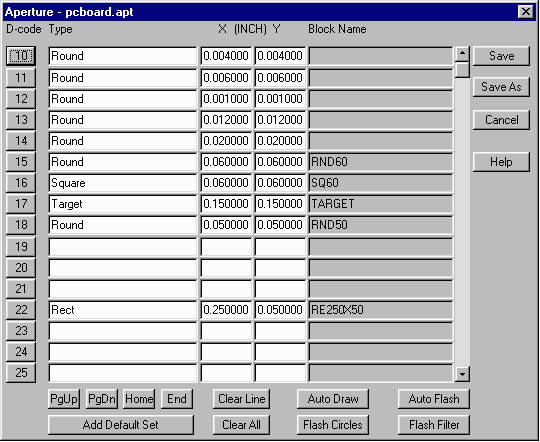
Special function buttons include:
|
Circles & Donuts to FlashesSome designers draw circuit pads using circles or donuts. ASM 502 can convert circles and donuts to flashes. It does this by scanning the file when you click on the Flash Circles button. It maps each unique circle diameter and donut size to a block name which can then be placed in the aperture list. The Flash Circles menu gives the designer full control of which circle and donut sizes are flashed. |

|
Selecting Layers to TranslateThe Layer Select menu defines which layers to translate. You can control translation parameters layer by layer. You also can rename the Gerber output file if needed. |
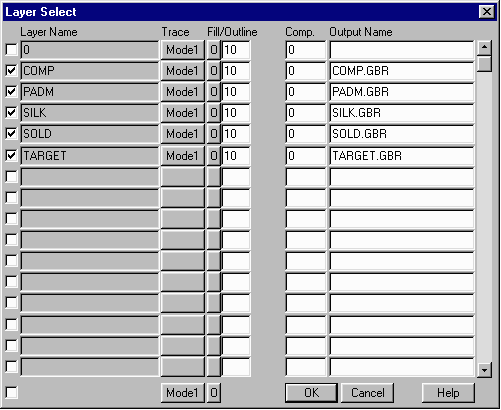
| |
Application Notes |
||
|
This note provides guidelines on how to setup and use AutoCAD to create good PCB layouts that will translate correctly using ASM 502. |
Translating a Microwave Layout from DXF to Gerber Describes how to translate a microwave layout done in AutoCAD into Gerber. |
|
|
Generating Excellon Drill Data Describes the concept of drill data and how to get it from a DXF file to Gerber. |
Creating Islands with Paint and Scratch Describes the concept of paint and scratch and how to produce clear islands in your film output simply and easily. |
|